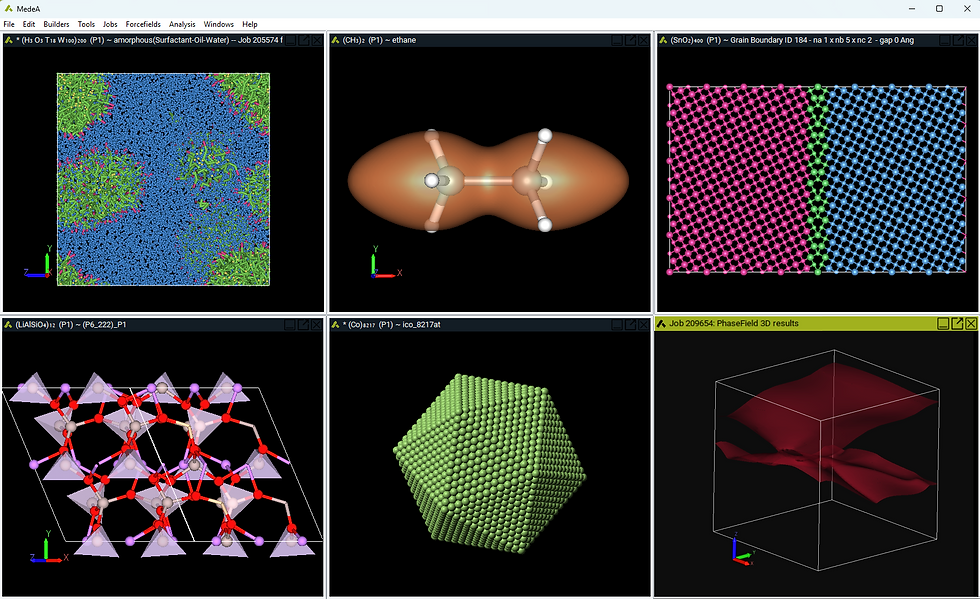UGM Presenter Spotlight: Krzysztof Parlinski
- Katherine Hollingsworth
- Sep 23, 2019
- 4 min read

This year’s UGM technical symposium features lectures from MedeA users in leading chemical, automotive, and engineering industries as well as contributions from key scientists and developers of the software technology such as VASP underlying the MedeA Environment. Our Spotlight today is on Professor Krzysztof Parlinski. Bio Professor and Founder of the Department of Materials Research by Computers at the Institute of Nuclear Physics, Polish Academy of Science, Krzysztof Parlinski is author of the PHONON software, implemented in MedeA, used for computing lattice dynamics from ab initio data (VASP,Wien2k) applied already to crystalline materials, crystals of all symmetries, defected crystals, surfaces, interfaces and other nanoobjects. Professor Parlinski has published over 300 articles in physics of molecular crystals, phase transitions, neutron/x-ray scattering, MD kinetics of domain formation, first MD simulation of topological defects of incommensurate phases, application of group theory, lattice dynamics, phonons, and method of Green functions. Abstract Phonon Anharmonicity from ab initio Calculations Applying principles similar to those used in creation the harmonic PHONON software, a novel nonperturbative approach of the anharmonic lattice dynamics of crystal is proposed. The method treats a crystal as an ensemble of supercells, each with atoms displaced from equilibrium positions, such that the created POSCAR mimics the atomic configuration arrising from all allowed excited phonons with amplitudes determined by the requested temperature. Next, using VASP and PhononA softwares the computed phonon dispersion curves are averages over created atom configurations to show the anharmonic phonon peaks and their finite widths and shifts. This method allows to treat directly the soft modes. The thermal conductivity can be calculated after addopting the Green-Kubo formalism to the present non-perturbative method. Anharmonic results for fcc-Pb, bcc-W, cubic-Si, fcc-MgO, mineral-MgSiO3, AlN, MgB2 and soft mode in NiTi will be shown. The calculated anharmonic behaviour of MgB2 supercelductors is well reproduced with the proposed method, inspite of the fact that the Born-Oppenheimer approximation is not obeyed in MgB2. When avaliable the results are compared to measured data. Some other opportunities of application of this method to study anharmonic consequences will be disscussed. The complete formulations of the harmonic and anharmonic theories is only shortly presented. The details can be found in the recent paper of the author, Phys.Rev. B98, 054305 (2018). The method is highly parallel and computationally very fast, since using VASP, in general it requires only single run of ionic loop for each atomic configuration POSCAR. Typically, a comprehensive anharmonic study of a material takes less then a (few) days. Other internationally renowned speakers at the User Group Meeting include: Antoine Claisse (Westinghouse, Sweden) Arthur France-Lanord (MIT, USA) Georg Kresse (University of Vienna, Austria) James (Jimmy) P. Stewart (University of Strathclyde, Scotland) Marianna Yiannourakou (Materials Design) Moritz to Baben (GTT, Germany) Richard Catlow (Royal Society, U.K.) Richard Smith (Naval Nuclear Laboratory, USA) Ryan Thomas (Honeywell, USA) Stéphane Brice Olou’ou Guifo (Volkswagen, Germany) Veronique Lachet (IFP-EN, France) Wes Everhart (Honeywell, USA)
General Agenda:
Tuesday 15 October: Hands on MedeA Training Welcome Cocktail Reception Poster Session Wednesday 16 October: Scientific Program Customer Banquet Thursday 17 October: Scientific Program Technical Discussion
Technical Presentations:

Presentations cover a broad range of research and modeling areas that will educate and inspire. It is this type of research which fuels the development of our software and enriches its scientific foundation.
Attend Hands-on Training:

Tuesday October 15 will be dedicated to Hands-on MedeA training.
A Windows laptop will be provided for each participant for the training, and all participants receive a training booklet. Materials Design scientists will be in the classroom to answer any questions on training materials and your modeling scenarios. This training session provides an exclusive opportunity to learn about theMedeA Environment software and to meet and interact with application and research scientists and software developers. Lunch, coffee breaks, and refreshments will be provided.
Present Your Research: Poster Session:

As part of this year's technical program, Materials Design will hold its first annual UGM poster session. Materials Design invites all its attending customers to present their research in a poster session during a relaxed yet invigorating cocktail social hour on Tuesday, October 15th after the training. Posters will prominently remain on display throughout the UGM. The poster session will be dedicated to recent developments in materials science using MedeA. If you are interested in presenting a poster at this year's UGM, please contact Dr. Ray Shan at rshan@materialsdesign.com. Please provide a title and a brief abstract for your proposed poster.
Network with Peers:

The Materials Design User Group Meeting represents an occasion to meet colleagues and developers, present results, learn about developments in MedeA, and see the latest developments in computational material science and engineering.
Venue:

Austria Trend Parkhotel Schönbrunn Hietzinger Hauptstrasse
10-14 1130 Wien, Austria +43 (1) 87 804-0 Hotel Number +43 (1) 87 804-603 Room Reservations
Negotiated Room Rates:
We have secured a special UGM room rate of €140/night (single occupancy) and €159/night (double occupancy) with the Austria Trend Parkhotel Schönbrunn.
Conference Registration:

Register now to secure your place at the 2019 Materials Design UGM. Registration for the User Group Meeting includes hands-on training, educational sessions, technical presentations and the opportunity for collaborative discussion with Materials Design and its network of collaborators October 15 – 17, 2019. Engage and network with MedeA users during a welcome cocktail reception, a customer banquet, a poster session, lunches, and coffee breaks, included when you register for the event. Registration is no cost for all current Materials Design customers.
If you have any questions, please contact ugm2019@materialsdesign.com.




Comments